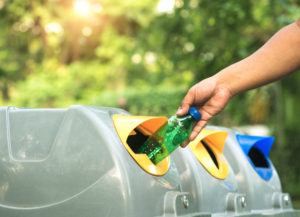This summer, hotels across the US will begin to resume normality. The COVID-19 pandemic hit the hospitality industry particularly hard, and after 18 months of restrictions, hotels are ready to welcome guests back.

While much of the hospitality industry was beginning to focus on more sustainable operations before the pandemic, today, there are new elements to consider as hotels must prioritize maintaining updated hygiene standards. Does this mean that single-use, single-serve is here to stay? What impact will PPE waste streams have on waste management within hotels, and can the industry find better ways to deal with them?
Convenience and service have always been at the core of hotels, and a focus on hygiene is an integral part of that. Unfortunately, this means large quantities of waste – from single-use shampoos and plastic-wrapped bathrobes to breakfast buffets that encourage indulgence. That said, hospitality may be better placed than other industries to deal with the robust measures put in place to protect guests and staff.
Sustainable hotel waste management can combat many of the problems hotels face, and with new challenges comes innovation. Today, balancing sustainability and hygiene is possible, and many hotels are finding ways to do this through new strategies and products. Here, we look at the problems faced by pre-pandemic hotels, how waste streams will change, and how hotels can adapt to a disrupted industry.
The COVID Factor
While there has been a positive trend towards sustainable hotel waste management, the restrictions in place to prevent the spread of the coronavirus could knock that off course. The pandemic has had a major impact on hotels and there is an entirely new stream of hotel waste – PPE.
 PPE (Personal Protective Equipment) is now commonplace across the world, but within hotels where so much attention was already paid to hygiene, often with single-use plastics, it could mean a huge step back. With international tourism only now beginning to pick up again, the full impact is yet to be seen, but there is no doubt that innovation will be needed to keep hotels on track.
PPE (Personal Protective Equipment) is now commonplace across the world, but within hotels where so much attention was already paid to hygiene, often with single-use plastics, it could mean a huge step back. With international tourism only now beginning to pick up again, the full impact is yet to be seen, but there is no doubt that innovation will be needed to keep hotels on track.
As an example, the days of buffet breakfasts may be numbered, and food waste could be significantly reduced through better managed single-portion servings that offer higher hygiene standards in today’s “new normal”. In addition, items such as reusable masks for staff can help reduce PPE waste, with multiple options now available and the WHO still approving the use of properly manufactured fabric masks.
Dealing with this new waste stream within hospitality, along with an influx of new guests as the industry opens up again, will require robust and comprehensive waste management systems and responsible recycling. Additionally, as the landscape begins to level out, flexible and adaptable systems that meet changing requirements will also be required to deal with both new and existing waste streams that are liable to fluctuate over time. Here, we look at the major elements of hotel waste and how they can be managed.
Single-use plastic waste in hotels
Plastic waste is a problem with serious consequences, whether that be microplastics in the food chain or the estimated $2.5 trillion in damage and lost resources it causes to fisheries, aquaculture, recreational activities, and global wellbeing.

While plastics might not represent the single largest waste stream for hotels, it has been the target of many operators’ sustainability efforts due to its ubiquity. Hotel bathrooms are particularly troublesome, with single-use products and plastic-wrapped cups, but the rest of the hotel room experience isn’t much better, often housing single-serve sachets with plastic-wrapped bathrobes and bagged pillows.
There are also less obvious examples, such as plastic hotel key cards. While reusable, they will end up in the trash eventually, and many end up broken or lost after a few uses.
Hotel food waste

Many hotels have in-house restaurants, whether for room service, bar food, or a silver service establishment. As with any restaurant, this can generate large quantities of food waste which, if not managed responsibly, will create a significant environmental impact.
Food is the single largest component of US landfills with roughly 80 billion pounds being thrown away each year in America. According to some estimates within tourism and hospitality, nearly half of the total waste produced by establishments is food. This is especially prevalent in hotels offering buffets, where plate waste (food that is left on guests’ plates) is a major problem.

Guest waste at hotels
While not a waste stream per se, the trash that guests generate is an important consideration when looking at general hotel waste management. Unlike with a business such as a restaurant, for example, hotel operators have little to no control over what clients bring – and dispose of – in their establishment. Even the most stringent company policies on plastic and food could still leave a hotel having to deal with more waste than expected.
Why hotel waste management is changing

One of the major factors driving a shift away from wasteful hospitality is consumer demand. Recent studies have found that over half of global travelers are now looking to travel more sustainably, and more than 60% of Americans are willing to spend more on sustainable products. Sustainable hotel waste management is not only essential for attracting guests but can also allow an operator to offset the costs through increased average daily rates.
Of course, it isn’t only consumer demand that is driving this change. Some hotel operators and owners are also becoming more eco-conscious and looking to push these changes through themselves. Additionally, there is an increasing number of government initiatives, whether plastic bans or broader carbon reduction policies, aimed at reducing waste and tackling climate change.
Solutions to hotel waste 
There are many ways to introduce better waste management into the hotel industry, and companies are taking steps to reduce some of the biggest contributors like plastics and food. As with any good waste management plan, the prevention of waste is the best solution, with the reuse and recycling of waste being secondary. There are now many examples of holistic hotel waste management being implemented.
Preventing plastic waste at hotels
Significant hotel chains have started to ban single-use plastics across the board. Rotana, for example, announced that it would remove all single-use plastic toiletries from its hotel rooms, saving an estimated 17 million plastic bottles and 100 tons of plastic every year.

What’s more, less obvious sources of plastic waste such as key cards are also being replaced, with some hotels already developing solutions such as replacing plastic key cards with mobile apps. Leveraging technology to reduce waste is a common solution and we’re likely to see more of this as sustainable waste management for hotels becomes the norm.
For waste that isn’t reduced, there is also the option to implement more robust recycling programs that help deal with waste in a sustainable way.
Food waste management

As one of the major sources, kitchen waste at hotels is already being targeted for change. One study from 2021 focused on breakfast buffet leftovers in four hotels in Germany and found that simple self-reporting using a food waste tracking system showed marked improvements in hotel kitchen operations such as refilling the breakfast buffet with less food, leading to:
- A 64.3% reduction of breakfast buffet leftovers (by mass)
- Saving an average of $9,000 per kitchen, per year
Beyond reduction, hotels are also looking towards composting to recycle food waste.
Guest waste management
Guest waste isn’t material-based waste and can include everything from food scraps to plastic to metal and glass. Therefore, one of the best ways to deal with this stream is by creating customer-facing waste management points. This can be as simple as clearly labeled trash cans that allow guests to separate recyclables, compostables, and general waste.

Beyond this, some hospitality establishments are now offering outreach to teach guests and staff more about sustainable waste management. This can extend beyond physical waste, to inform people about reducing hotel power and water waste as well.
There is no question that hotel waste is a major problem within the industry, but operators are beginning to tackle the issue through more sustainable management. The full impact of PPE on waste streams is yet to be seen, but with such strong customer demand for greener hospitality, the trend towards sustainable hotels is likely to continue.
For more information about responsible waste management for hotels or other businesses, speak to one of our TRUE Advisors today or subscribe to the RTS blog.

